-
€
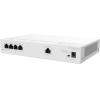
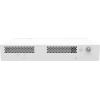
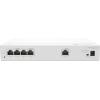
Huawei S380-L4P1T è un gateway della serie eKitEngine. Combina le funzioni di un router e di uno switch gestito Layer 3 ed è dotato di 5 porte Gigabit Ethernet, di cui 1 porta WAN e 4 porte LAN. Sulle porte LAN è presente un'uscita di alimentazione PoE+; la potenza massima per porta è di 15,4 W a 802.3af o 30 W a 802.3at. Il budget di potenza totale per l'intero dispositivo è di 50 W. La larghezza di banda massima di commutazione è di 8 Gbps e la larghezza di banda egress è di 1 Gbps. L'S380-L4P1T è in grado di supportare fino a 200 utenti e supporta server/client DHCP, client DNS, client PPPoE, ACL e NAT. La gestione avviene tramite interfaccia grafica Web, applicazione o SSH. Il dispositivo ha un piccolo chassis da tavolo e un raffreddamento passivo. Il gateway utilizza un alimentatore esterno da 56 V CC / 1,07 A; il consumo massimo di energia a pieno carico è di 61,65 W. L'S380-L4P1T è ideale per piccole reti in cui si utilizzano fino a 4 punti di accesso. Funge quindi da router, switch principale e switch di accesso allo stesso tempo. È possibile collegare gli AP direttamente ad esso, semplificando al massimo la struttura della rete.
5 porte Gigabit Ethernet
Il dispositivo è dotato di 5 porte Gigabit Ethernet (10/100/1000 Mbps), di cui 1 porta WAN e 4 porte LAN. La capacità di commutazione è di 8 Gbps e la velocità di inoltro dei pacchetti è di 300 Kp/s in upload e 420 Kp/s in download.
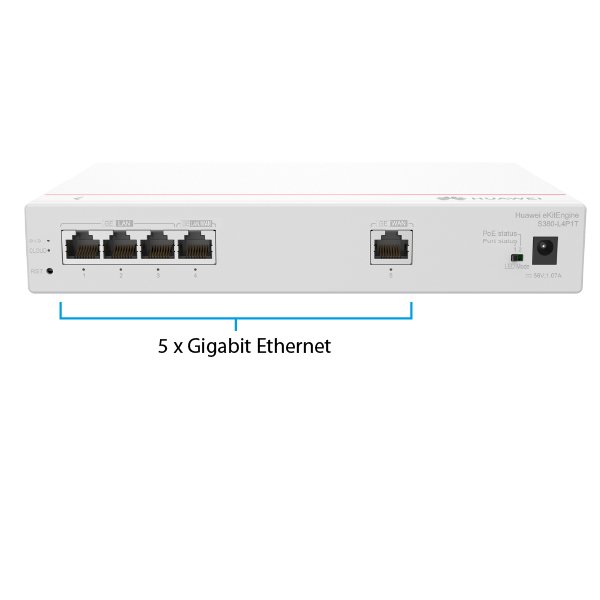
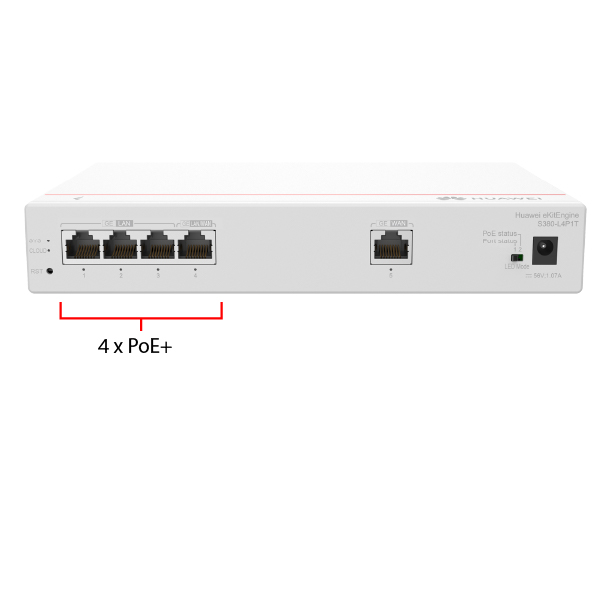
4 uscite PoE+
Tutte le porte LAN dispongono di un'uscita di alimentazione PoE+. La potenza massima per porta, secondo lo standard, è di 15,4 W a 802.3af o 30 W a 802.3at. Il budget di potenza totale è di 50 W, sufficiente per collegare 4 punti di accesso con meno di 12 W di potenza.
L'uso del PoE consente di effettuare la trasmissione di energia e dati tramite un cavo Ethernet. Con questo tipo di switch, è sufficiente far passare un solo cavo per ogni punto di accesso e non è necessario utilizzare alimentatori aggiuntivi.
Controller incorporato
L'S380-L4P1T può fungere da controller (WAC) per la serie di access point eKitEngine. È possibile collegare al dispositivo fino a 32 AP e fino a 200 utenti contemporaneamente. Le funzionalità offerte sono quindi sufficienti per le piccole reti - domestiche e di ufficio.

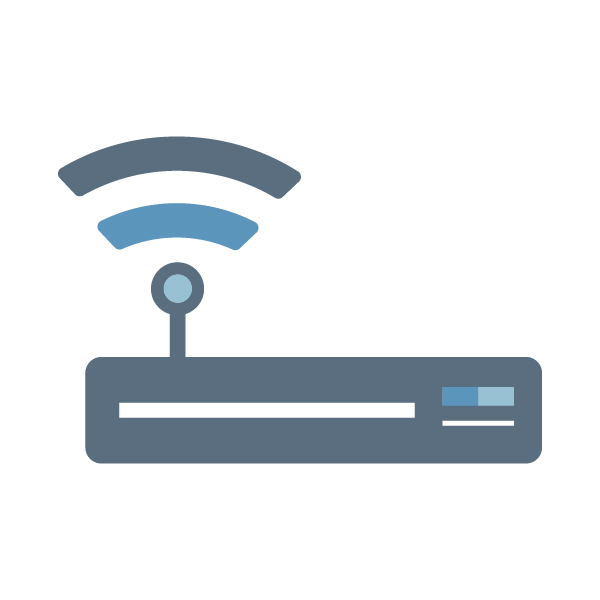
Funzionalità del router
Il prodotto offerto funge anche da router, supporta NAT e server DHCP. La gestione viene effettuata dall'interfaccia grafica Web, dall'applicazione o tramite SSH. Il software consente di monitorare lo stato della rete e di diagnosticare i problemi che possono verificarsi durante il suo funzionamento.
Dispositivo 3 in 1
Huawei S380-L4P1T combina le funzionalità di switch, router e controller di access point. Utilizzando l'alimentazione PoE, consente persino di rimuovere lo switch di accesso dalla rete e di collegare direttamente l'AP. Nelle reti composte da un massimo di 4 access point, l'S380-L4P1T può fungere da unico dispositivo oltre all'AP. Perfetto per grandi abitazioni o piccoli uffici, vi permetterà di ridurre il costo dell'intero sistema, garantendo al contempo un funzionamento efficiente e stabile.
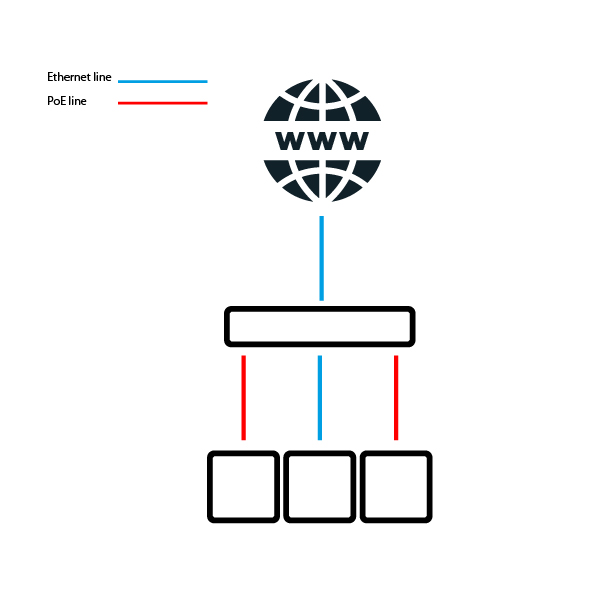
Caratteristiche
| Huawei S380-L4P1T | |
| Numero massimo di utenti | 200 |
| Capacità di commutazione | 8 Gb/s |
| Velocità di inoltro dei pacchetti |
Upload: 300 Kp/s Download: 420 Kp/s |
| Throughput di egress | 1 Gb/s |
| Porte WAN |
1x gigabit Ethernet 10/100/1000 Mb/s |
| Porte LAN | 4x gigabit Ethernet 10/100/1000 Mb/s con PoE+ |
| Numero massimo di indirizzi MAC | 2K |
| Dimensioni | 35 x 210 x 130 mm |
| Altezza | 1U |
| Peso | 0,7 kg |
| Metodo di alimentazione | Alimentatore esterno |
| Tensione di ingresso nominale dell'alimentatore | 100 - 240 V AC, 50/60 Hz |
| Intervallo di tensione di ingresso dell'alimentatore | 90 - 264 V AC, 45 - 65 Hz |
| Consumo massimo di energia |
Senza PoE: 11,65 W Con PoE: 61,65 W (budget di potenza PoE: 50 W) |
| Temperatura di funzionamento consentita | Da 0 a 40 C |
| Temperatura di stoccaggio consentita | Da -40 a 70 C |
| Umidità ammissibile | 5%-95% senza condensa |
| Raffreddamento | Passivo |
| Caratteristiche del software | |
|---|---|
| Funzioni di interfaccia di base |
VLAN Frame Jumbo Rilevamento dell'accensione/spegnimento della porta Auto-negoziazione Interfaccia VLANIF |
| Ethernet |
16 VLAN Tipi di porte: access, trunk, hybrid Assegnazione VLAN basata sulle porte Memorizzazione automatica degli indirizzi MAC Address aging automatico degli indirizzi MAC, voci MAC statiche Filtraggio MAC |
| Routing IPv4 unicast | Statico |
| Ottimizzazione WAN | Bilanciamento della larghezza di banda in base all'indirizzo IP e al tipo di connessione |
| Accesso utenti | Client / server DHCP, client DNS, client PPPoE, ACL, NAT |
| Gestione |
Interfaccia web grafica Applicazione SSH |
| Manutenzione della rete |
Ping Tracert Diagnostica |






 Polski
Polski English
English Italiano
Italiano Español
Español Čeština
Čeština Српски
Српски Deutsch
Deutsch Ελληνικά
Ελληνικά Slovenský
Slovenský




